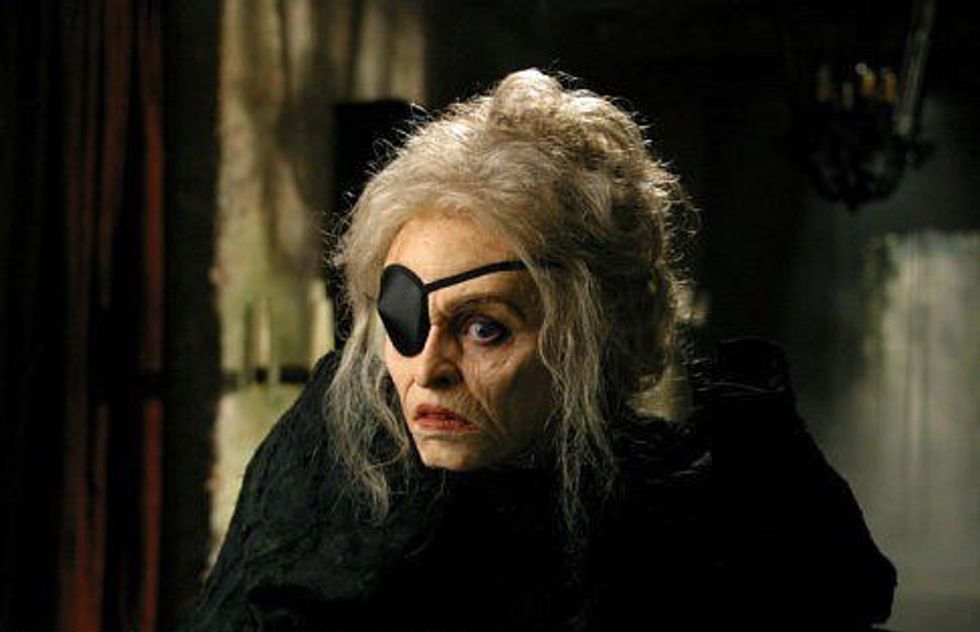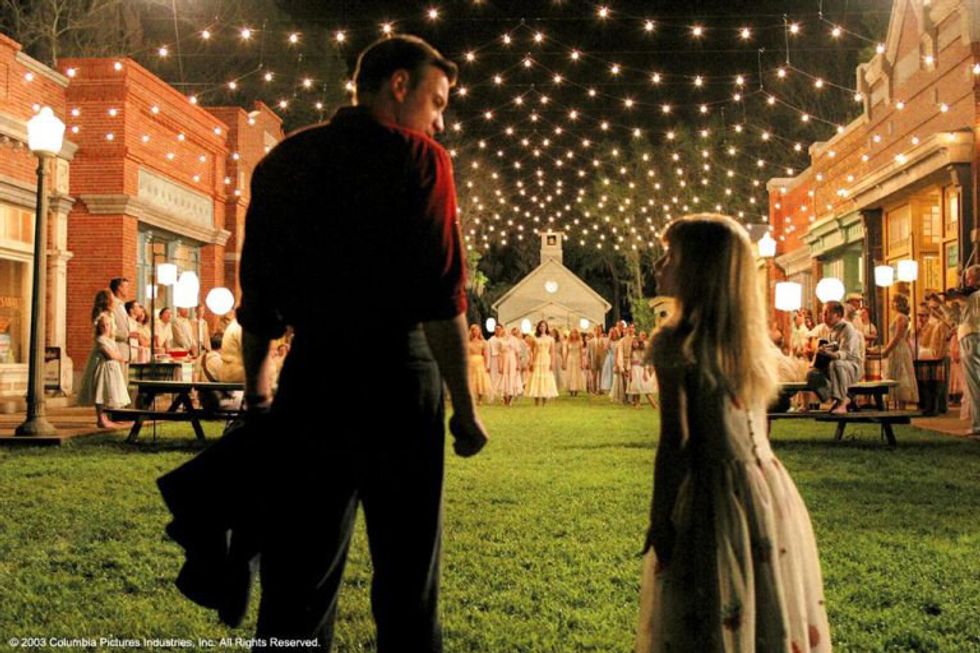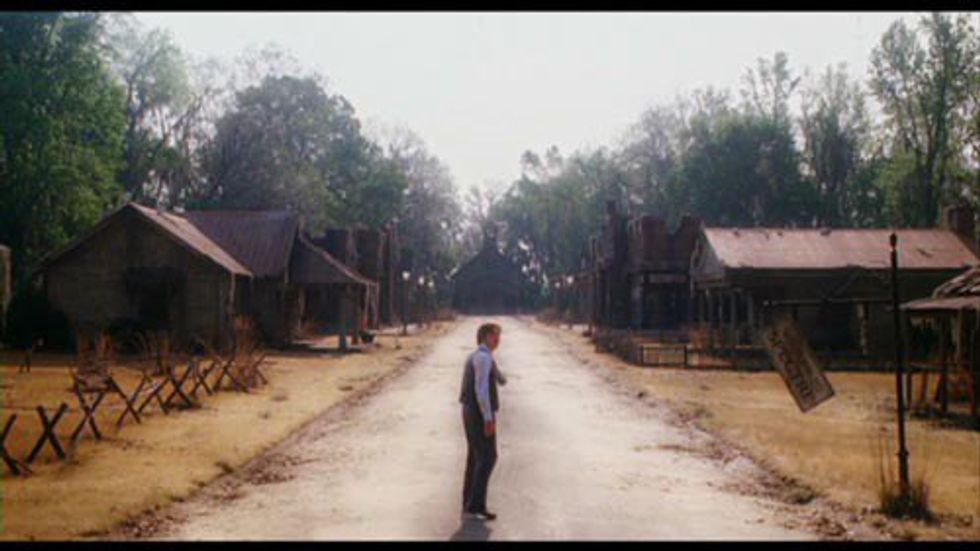In "Big Fish," one of Tim Burton’s most surrealistic films – believed to be a reflection of his adult self – an expansive and imaginative view is shown when a young man by the name of Edward Bloom allegedly lives an extraordinary life: equipped with fantasy-like phenomena, suspiciously good luck, and even a beautifully happy ending. What captivates the viewers of this movie is the repetitive use of exaggerated events, unlikely occurrences, a lighthearted yet dauntingly obscure atmosphere, and most entrancing, the edifying meaning that life is rarely as exciting as it is told. It is through the perspective of a real person telling the chronology of occurrences, for existent people are not and will never be an actual character in a story, and therefore will never peek the exaggerated essences that fictional characters possess. It is through our interpretations of life that aid in our mental well-being and help us to disassociate from the disruptions and disturbances of life, while still drawing the very fine line between the physical world, and the mythical world.
Psychoanalytic criticism can interpret authors. It can interpret characters. It can interpret the literary form itself. Or it can interpret audiences, that is, readers and their surrounding culture […] but characters are not people, and to pretend that they are can falsify their status as literary characters, as verbal and filmic artifacts (Parker 2015:122-124).
The Mirror Stage with the help of a witch
During Big Fish, many improbable events take place that set the characters on a sort of fabled scale of what could possibly be the characters enacting the “Mirror Stage,” – when one begins to see their self apart from their surroundings that are also reflected in the mirror. When Edward is a child, he and a group of his friends are frightened by a supposed witch that lives in a haphazard, disheveled house who allegedly holds the truth to the death of any who peer into her eye. While the other children see their deaths then cry out in despair and run away in terror, contrastingly, Edward seems rather indifferent to the death he foresees, most likely because his interpretation on life is much simpler and less expectant than others. He understands, even in his youth, the large amount of ambition and plans for success he has in life and that his death will only secure the end of his beautiful journey. Edward states in the movie that he is a big fish in a little pond and the idea that this sets into place is that life is only what is interpreted by the vast number of people who inhabit it.
Edward identifies with his aged self in the witch’s eye and is content with the ending to his story. It is an idea of identification. As stated by Dr. Erik Liddell, “You can never see yourself – you only see an image of yourself, and identify with that image” (Liddell, 2015).
Depicting intention in works
Though Burton’s film was widely influenced by Daniel Wallace’s Big Fish: A Novel of Mythic Proportions, the interpretation of the story is told through Burton’s more dreamlike perspective, and in that, we are able to peek into what he could have psychoanalytically drawn from when creating the film.
Parker states about psychoanalytic criticism, “readers [or viewers] could reduce art to biography and make writers’ early childhoods and a few phallic symbols explain everything about their writing” (Parker 2015:111). In that statement, it is hypothesized that through a form of psychoanalysis, the audience can sort of deconstruct the symbolism and structure of the work of art and be able to depict the intention behind it. “Critics can interpret an author psychoanalytically, almost as if they were psychoanalyzing the author” (123).
Reflecting our Inner-selves and finding our places
When dealing with any form of psychoanalysis, it has to be understood what the defining line is between what is present and what is masking the present. People often treat their veracities as a manifestation of something greater. Ideas, values, and physical objects, are projected to be the stepping stones that lead to more appealing realities. Whether or not the evasion from actual instances are pertinent to the masking of one’s true sentiments, the story displayed leaves a much larger impact on those who will remember that person once they are gone. This, the hint that the fantastic adventures were true, is a conventional resolution to a tall tale. But in Big Fish, the truth of Edward’s tales is finally irrelevant. It is by inventing these tales that we make sense of our lives – make it possible, in some way, to live them, rather than give in to depression or suicide. And it is by telling tales – or making movies – that we perhaps touch one another most deeply (Kehr 2003:14).
Coping in the form of displacing
Similarly, people are often faced with the notion to find their significance in the world which can be a daring and treacherous journey. Whether it is in terms of one who is masked or the raw and exposed individual, is dependent upon their interpretation of the world and themselves. Many people will displace their fears into something more minute and easily digested in order to better lament what is troubling them. In Faulkner’s As I Lay Dying, “he displaces his anxieties over the loss of his mother onto the death of a fish that help him process the death of his mother” (Parker 2015:130).
Likewise, one of the vital characters in the story, Karl, a giant who plummets through the town of Ashton, is faced with the opportunity to leave the small town with Edward, in hopes to see the world and find a city more suited to himself. After they leave Ashton, Edward proposes that he and Karl take separate paths and meet up at the end of them. After spending a life alone, Karl fears this is Edward’s attempt to run from him and Karl negates the idea. Edward ensures that he was not trying to run, he gives Karl his belongings so that it would be definite that Edward would stay true to his word. Karl was given the task of keeping Edward’s backpack safe, and to not lose it.
The gentle giant, still wary that his new friend will leave him, uses the backpack that Edward loaned him as a way to console his worries. Karl displaced his fear of losing Edward into his intent on not losing Edward’s belongings. It was a much simpler task to handle and less significant, therefore Karl could let go of his anxieties over Edward and focus now on finding the end of the path so that he could see his friend again and safely return what was given to him.
Be afraid not of adventure, but of settling when adventure has just begun
When Edward continues his journey to see the world, he is seeking a sort of clarity that will hopefully give him the satisfaction of adventure he craves. He is faced with many unlikely instances which bring a sense of ambiguity. For example, during Edward’s diversion through the forest while journeying to find Karl again, he finds a Utopian town in the woods, called Spectre. This town is “everything a man could dream of” (Bloom) in that the atmosphere is tranquil, the townsmen are more than welcoming, and the love and familial presence is enticing. Edward stays for the day, but decides that even though this town is magnificent in so many ways, he could not settle because he had not yet seen the world.
It is not that the ambiguity presented in the film is creating a sense of disorder, but it is conjoining the differing instances and piecing together a timeline of surprising events. Edward is often confronted with bizarre and complex situations, but they all further his journey and push him towards his destiny. Explained by Nathan Szajnberg, in an article from the Bulletin of the Menninger Clinic, “ambiguity is not chaotic: It is structured to have an enigmatic quality, not only bridging two images, but also leading from one to another” (Szajnberg 2011:4).
Our perceptions may reflect our experiences
As stated, it’s not that Spectre has one specific meaning or relevance, but that the town means many different things at different times. During Edward's journey, he is faced with enormous complications, as well as incredible blessings, but the importance of either is still the same. When Edward first discovered Spectre it was a beautiful town, but later in the film when that town is revisited, it had become a desolate, dilapidated cluster of forgotten homes and businesses. The people are much more rugged and the atmosphere is dense with insensible and dejected abandonment. It’s not that the town means one specific thing, but that the town merely meant somethings to Edward in different ways.
Spectre was the paradise Edward had always dreamed of, and the first time he stumbled upon the town he still had experience only from the small town he was raised in, and hadn’t much of an outlook on the rest of the world. Though this town was wonderful, and there was seemingly no better place – as he did not expect to find one – Edward needed to see the world for himself, in hopes that the town would await his return; later in the film when Edward returns to Spectre and it’s viewed as the abandoned town, this could be because he has now seen what else the world has to offer and the idea of a Utopian society doesn’t seem realistic anymore. His setting had changed and therefore his point of view changed as well. His expectations were unconsciously lifted.
A disordered timeline may reflect the complexities of the mind
The viewers are faced with the complex arranging of events throughout the film, which I find intriguing. Big Fish has many “out of place” clips that either peer into the future or recant on the past. The use of foreshadowing gave the viewers an idea of what is to come in the film as well as clarified past events. The writers or directors as well can unconsciously contribute hinting elements to the film that are not always noticeable, but make a beneficial impact. As defined by Bonnie S. Kaufman, “Pathography – essentially Freud’s approach, but with an emphasis on what the understanding of the unconscious contributes to the art. It is an approach that still has its limitations, but under the right circumstances, it can make a useful contribution” (Kaufman 2011:368).
"The constant struggle between the limitations of
life and the imaginative desire to seek greatness
really puts the readers/viewers into the mind of the author."
Relating back to Burton’s use of symbols and odd referencing that seem to epitomize the nonconformity he was shamed for in his youth, “A second methodology is to consider the film as a reflection of the filmmaker’s unconscious. Biographical material and quotations from the auteur are used as replacements for free associations of an analysand in a clinical process, and the film is seen as an outgrowth of the filmmaker’s intrapsychic conflicts and early history” (Gabbard 2001:244).
To further, Burton was born in the fifties, when the American dream was broadcasted throughout the country, and society was expected to live as a whole, conformist civilization. This posed as an obvious problem for those who were considered “different” and had a desire for nonconformity. This is brilliantly explicated through all of Burton’s films, (Edward Scissor Hands, Ed Wood, Big Fish, etc.) where odd yet alluring characters that are portrayed as outcasts dominate the screen. In Big Fish, Karl is a giant who could not find his place in the world, until he stumbled upon the circus; Amos Calloway who was the ringleader of the circus that Karl joined, while also disguising the werewolf in him; or Don Price, the background to Edward’s hometown fame in Ashton who could never be brought into the spotlight.
The constant struggle between the limitations of life and the imaginative desire to seek greatness really puts the readers/viewers into the mind of the author. It has been argued more recently whether the characters in the film should be portrayed simply by their roles in the film, or rather what they could potentially be by their symbolic meaning. Many film scholars argue that the characters in a film are not analysands in a psychoanalytic process, and a greater emphasis should be placed on the function of a character in the narrative rather than on that character’s underlying motivations for behavior (Gabbard 2001:245).
To conclude my obvious love for Big Fish
Though this film in particular is one that is not commonly known, I believe it is one of the greatest films Tim Burton has ever directed. Its use of whimsical scenery, bizarre individuals, unlikely occurrences, and magnificent imagination set an almost euphoric mood in the viewer. There is a very satisfactory ending when Edward Bloom — while on his death bed — was able to live one last adventure through the tale by his son, and was set free into the pond, surrounded by all of the unusual friends he had made in his adventurously lived life. As stated by Edward’s son, William, “you became what you always were, and that is a very big fish.”
Reference in print:
Parker, Robert Dale
2015 “Psychoanalysis” How to Interpret Literature: Critical Theory for Literary and
Cultural Studies, 111-147. Oxford University Press, New York.

























